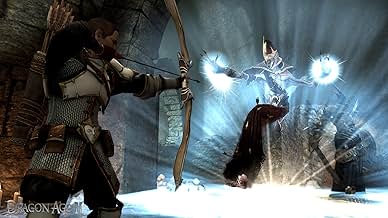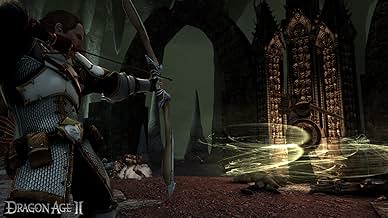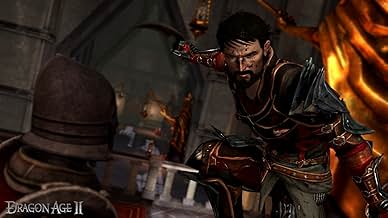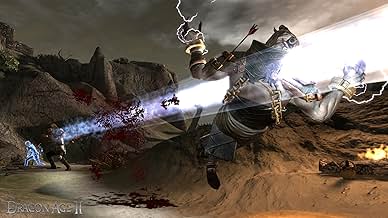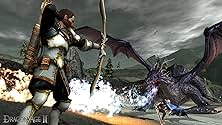Ajouter une intrigue dans votre langueThe medieval world of Thedas is invaded by demonic Darkspawn. Hawke and his family are saved by a powerful mysterious witch Flemeth. They end up in a foreign city where racial, religious and... Tout lireThe medieval world of Thedas is invaded by demonic Darkspawn. Hawke and his family are saved by a powerful mysterious witch Flemeth. They end up in a foreign city where racial, religious and political tensions threaten to tear it apart.The medieval world of Thedas is invaded by demonic Darkspawn. Hawke and his family are saved by a powerful mysterious witch Flemeth. They end up in a foreign city where racial, religious and political tensions threaten to tear it apart.
- Réalisation
- Scénario
- Casting principal
- Récompenses
- 4 nominations au total
- Hawke - Female
- (voix)
- Hawke - Male
- (voix)
- …
- Anders
- (voix)
- …
- Carver Hawke
- (voix)
- …
- Fenris
- (voix)
- …
- Isabela
- (voix)
- Keran
- (voix)
- …
- Viveka
- (voix)
- …
- Captain Ewald
- (voix)
- …
Avis à la une
Despite this, the game has its strong points. One of the highlights is the visual development of the characters, particularly the Qunari. The developers have made significant changes to the design of this race, giving them unique features that make them even more interesting. The Qunari now look not only menacing but also quite charismatic, adding depth to their presence and making every encounter with them memorable.
Another important aspect is the combat animations, which have significantly improved compared to the previous game. The battles have become more dynamic and visually striking, adding extra excitement to the gameplay. Players can enjoy fluid movements, new special effects, and powerful strikes that make every fight engaging. This aspect of the game deserves praise, as it adds more adrenaline to the combat sequences and makes them more thrilling.
However, despite all these improvements, there is one major issue that significantly detracts from the game-the repetitive locations. This is one of Dragon Age 2's biggest flaws. No matter what quest you're on or where the events are taking place, it often feels like you've already been in these areas before. Many locations, both indoors and outdoors, are frequently reused, creating a sense of monotony. This can greatly diminish immersion in the game world, as the player constantly encounters the same environments. If Dragon Age: Origins brought new surprises with every location, this game sadly lacks that diversity.
This lack of variety in locations is a serious problem, drastically reducing the overall enjoyment. For a game of this scale, it's a significant downside, as the adventure atmosphere is partly lost due to the absence of novelty in the surroundings. Despite these drawbacks, Dragon Age 2 still has its strengths.
In addition to dynamic combat and well-developed characters, the companions' storylines are worth highlighting. Each of Hawke's companions has their own personal story, motivations, and personalities, making them more than just fighters in your party. They are full-fledged characters with their own dramas. Interaction with them, just like in the previous game, remains one of the strongest aspects. Your relationships with your companions impact the story's progression, and their personal quests add depth to the game.
Dragon Age 2 also explores the theme of social conflicts in Kirkwall, particularly the tension between mages and templars. These events play a crucial role in the game, forcing players to make tough decisions that can change the course of the story. This adds more weight to the game and encourages reflection on moral dilemmas.
In conclusion, Dragon Age 2 is a game with great potential, featuring both strong and weak points. If you're willing to overlook the repetitive environments and certain monotony, the game can offer plenty of enjoyment thanks to its intriguing storyline, dynamic gameplay, and excellent characters.
With that said, I have some major gripes with DA2. First, you don't have control over your party members armor. This drives me nuts, and I find this change from the first game inexplicable. Second, and much more confusing is that the world is significantly smaller than Origins. In Origins, you explored a continent filled with castles, caves, mountains, villages, and cities and tunnels under the Earth. The world was diverse and rich with life and history. In DA2, the entire game is in the city of Kirkwall and a few surrounding areas. Third, and the most irritating, is that the game designers reuse the same areas over and over and over. When I found myself in the brothel and then later a noble's house, and they had exactly the same rooms with the same layout, it made me want to punch the game. Not to mention, that you enter 15 different caves, and each cave is simply the same set piece being reused constantly. On top of that, you find yourself running around the same parts of Kirkwall over and over and over and over and over. Thank God that the quests have quite a bit of variety, but at the same time, I found myself wanting a centralized interested story to keep the game moving. Hawke is a fun character, and his/her voice acting is terrific, but again the game finds itself wanting in the plot department. Also, all of the supporting characters are well-developed and easy to care about.
Overall, the game is very well-made. Most of its faults come from comparing it to the first, which again, was a much better game. I expected this game to be an 11/10, but sadly it falls somewhere closer to an 8/10. I will continue to play Dragon Age games, but unfortunately this game put a damper on that desire.
Although Hawke, the game's protagonist cannot be as well-defined as the protagonist in Origins, having a definitive background allows Hawke to be have the most personal storyline, as opposed to being isolated from the narrative as a savior archetype. Not only that, but Hawke themselves is a very personable character, whose personality can be defined and redefined by the dialogue choices you make, which do have some impact in dialogue and subplots.
Furthermore, restricting the game to a singular location allows you to have a more personable experience with the location, as opposed to simply stopping by for a few hours to save everyone, you experience what life is in Thedas, and you see how the narrative in the world around you progresses.
The narrative, although being my least favorite aspect of this game, especially due to the game's third act and how it handles the overarching conflict, still manages to be immersive - out of every Dragon Age game and DLC, this is the only game that has made me legitimately cry because the game managed to make me care about its more minor characters.
The gameplay is also the most enjoyable in the series. Some do not enjoy the more fast-paced and action packed change of style, but it personally made the game's combat more enjoyable for me - Dragon Age is partially notorious for having rather bland gameplay, and Dragon Age: II provides the most enjoyable combat experience.
Finally, the characters are what truly make this game my favorite of the series. Not only are there practically no restrictions of who you can romance - a win for player-choice and homosexual gamers, but your relationship with the characters is more three-dimensional, as you can either be a friend or a rival to them, and in both instances you can romance the character, leading to a lovey dovey romance, or a toxic relationship. The best part about the new relationship system is how rivalries might actually be better for those characters, as friendships often enable them to do dangerous things, whilst rivalries can prompt a change in perspective.
Dragon Age: II is truly an underrated gem, despite all of its flaws, much like Origins was despite its flaws.
Varric, in particular, stands out as one of my all-time favorite characters. His wit, loyalty, and charm make him the ultimate companion, and I find myself taking him everywhere in the game. Whether he's offering humorous commentary or heartfelt advice, Varric is the kind of friend you want by your side, both in and out of battle.
Another aspect I adored was how the game tied itself to its predecessor. Some characters you meet in this installment make direct callbacks to the events of the first game, and those moments are nothing short of fantastic. They not only reward long-time players but also create a deep sense of continuity and immersion. The ability to import choices from the previous game was groundbreaking for me, as it made the world feel alive and reactive to the decisions I had made before. Few games at the time offered this level of interconnectivity, and it was an experience that felt truly personal and unique.
The combination of an emotionally gripping story, unforgettable characters, and the way the game respected and built upon your previous choices is what makes this installment so special. It's a game that stays with you long after the credits roll, and even years later, I find myself revisiting it to relive the magic all over again.
Le saviez-vous
- AnecdotesIn Act 1, if you talk to the bartender at The Hanged Man then he may say something about the rapid decline in the pigeon population in Ferelden. This is a reference to Shale from Dragon Age: Origins.
- Citations
Isabela: I spy with my little eye, something that is... red. And socially uncomfortable.
Aveline Vallen: Ugh.
Isabela: No guesses? It starts with A.
Aveline Vallen: Shut up.
Isabela: Ooh, my mistake. It starts with such a B.
Aveline Vallen: Time and a place, Isabela. No games when we're this deep in a mess.
Isabela: Fine. Gone from B to a real C, anyway.
- ConnexionsFeatured in Sage Reviews: Dragon Age II (2011)
- Bandes originalesDestiny Of Love
By Inon Zur, Idan Reichel, Aubrey Ashburn (as Olivia Orr)
Performed by Aubrey Ashburn (as Olivia Orr)
Meilleurs choix
Détails
- Couleur




